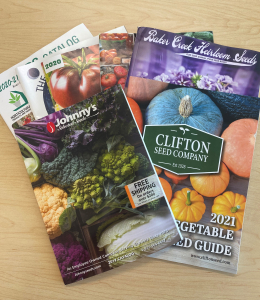Winter weather is here and activity in the garden has slowed down. For gardening enthusiasts, their green thumbs might be itching to be outside doing something in the garden during this time of year. Winter is a great time to do several garden activities that can pay off in the spring. Below are a few winter garden activities:
Mulching
Winter is one of the best times to add a new layer of mulch to your landscape. Why? It is so much easier this time of year because you have less weeds and plant growth to battle or work around when mulching. Mulching in the winter will also allow for your landscape to battle weeds come spring time and will reduce the amount of weeding you have to do next growing season. Not only does mulching help control spring weeds, but it also provides many benefits during the winter. Mulch can provide a layer of insulation that will protect shallow root systems. It helps prevent root injury that can be caused by potential freezing and thawing of soil during the winter. Avoid applying too thick of a layer of mulch which could attract mice and voles. A mulch layer of 2 to 4 inches is recommended. Also, avoid piling mulch up against tree trunks which can encourage decay. Select mulch material that is loose and airy and will not compact.
Winter Cleaning
You may have spring cleaning time for the inside your home, but winter cleaning in the garden can provide many benefits. Winter is an easier time to clean up a garden or landscape because so many plants and weeds have died back during the cold temperatures. The major benefit of cleaning up and removing dead plant debris is to reduce the amount of diseases and insects that will overwinter and reappear (often in greater numbers) next year. For many disease and insect problems that we don’t have much control over, simply picking up dead leaves, stems, branches, and left over fruits and vegetables is something we can do to fight a pest problem. Diseases and insects will frequently overwinter in plant remains until warmer weather and new, young plants allow them to become active again. One important tip when cleaning up is to be sure to remove the debris from the area. Leaving the plant debris on site or close by will still allow pests to remain.
Another benefit to having a winter cleanup in the garden is to remove remaining weeds. Weeds are adapted to survive, making it an on-going battle when it comes to gardening. A single weed plant can produce thousands of seeds. Instead of getting more relaxed in weed control during the cooler seasons, it is important to remove weeds left behind so they do not produce seeds which can remain in the ground for extended times until conditions are more favorable for germination. Removing weeds will prevent the weeds from “going to seed” (reaching seed production stage) and having a bank of seeds in the ground ready to germinate in future seasons.
Equipment Care
Winter is also a good time to winterize your garden equipment. Clean any gardening equipment before placing into storage for the winter. Change the oil in lawn mowers and weed eaters to prevent contaminants from staying in the engine over the winter. Clean the soil off of shovels, hoes, rakes, and other gardening tools to prevent the spread of possible soil-borne diseases.
Start Planning
There are many winter days it will be too cold to be outside in the garden. It is not too early to start making garden plans for next year. Take time to think about or look through garden journals or notes to determine what worked and didn’t work in your garden this past year. Start jotting down ideas and notes for what you would like to do or add to the garden and landscape this year. You can also start to browse through seed catalogs and garden magazines to see what is new for next year and pick out new plants to try.
Take advantage of these winter days and give your garden and landscape a good clean-up and prepare for next year. You will thank yourself next season, knowing that you fought to reduce diseases, insects, and weeds, but will also have a spruced up landscape along with new ideas when warmer spring weather.
Jessica Strickland is an Agriculture Extension Agent, specializing in horticulture for North Carolina Cooperative Extension in Wayne County.

(Photo Credit: J. Strickland, 2020)

